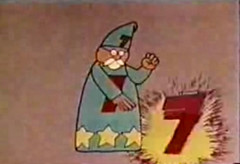Was ist Aufklärung?
A few people have responded to my wonderings on John Cage and semantic freedom with the suggestion that the weblog might be a form of communication that encourages the free play and participation of its readers, who are asked to think along for only a short time before surfing away. Posts tend to be suggestive, provisional sketches, not attempts at mastery, either of meaning or the reader. The newness of posts, the immediacy of their publishing, gives one the feeling that active mental life is out there, teeming, tracing something neon in the dark, contriving novelties for our amusement and incitement that we can take or leave according to our intellectual mood.
A cultural conservative—someone like, say, David Bell, who believes that educated authorities ought to guide us in our aesthetic lives and who has only contempt for the average cultural consumer’s faith in their own preferences—such a one might consider blogging just another species of cultural fast-foodism. An atavistic return to the desperate desire one felt before the variety of miniature texts pictured in a Troll or Scholastic book order. What happens when narcissistic and morbid modernist impulses are allowed to inhabit the organic-community-destroying virtual space of state-sponsored cold-war technology’s greatest contribution to post-industrial capitalism. A consumable simulation of thought without institutional or canonical guarantees of intellectual value.
Let us consider further David Bell. He complains bitterly in the foreword to a long and (as far as I can tell from some semi-careful skimming) unrewarding book that in our post-bourgeois, modernist-infected culture of intellectual decadence, readers don’t bother to read books cover to cover but only skim to find the parts that fit best into their own habits of classification and comprehension, and to find something they can deploy semi-ironically at a dinner party.
I guess I agree that one ought to read beyond one’s present sense of what’s comfortable and interesting, but for the most part, I must disagree with David Bell’s complaint. None of us has time for non-fiction books in their entirety, and none of us will stand for such a prolonged experience of servitude. Fiction is obviously different, so long as it offers its readers freedom of imaginative movement; since good fiction asks us to share in the creation of meaning rather than to sit down and shut up, we are willing to accept its extended constructions in the order and with the degree of thoroughness that the author deems best. But in reading non-fiction, let eclectic, Emersonian reading be the rule: read deeply, often, and selfishly; read as carefully or carelessly as you must to engage your own powers of connection. The weblog may be a form of text that suits this sort of reading.
(Apologies to my college friend Dave Bell for any referential slippage; Dave Bell is a fearless reader of unintelligible texts and a defender of the living mind against stultifying academic norms.)
(Oh yeah—what is enlightenment? Kant: Enlightenment is the emergence of a person from self-incurred minority. Minority is the inability to make use of one’s own understanding without the guidance of another. Perhaps sometime in the next few posts we'll quibble with the "self-incurred" bit.)
A cultural conservative—someone like, say, David Bell, who believes that educated authorities ought to guide us in our aesthetic lives and who has only contempt for the average cultural consumer’s faith in their own preferences—such a one might consider blogging just another species of cultural fast-foodism. An atavistic return to the desperate desire one felt before the variety of miniature texts pictured in a Troll or Scholastic book order. What happens when narcissistic and morbid modernist impulses are allowed to inhabit the organic-community-destroying virtual space of state-sponsored cold-war technology’s greatest contribution to post-industrial capitalism. A consumable simulation of thought without institutional or canonical guarantees of intellectual value.
Let us consider further David Bell. He complains bitterly in the foreword to a long and (as far as I can tell from some semi-careful skimming) unrewarding book that in our post-bourgeois, modernist-infected culture of intellectual decadence, readers don’t bother to read books cover to cover but only skim to find the parts that fit best into their own habits of classification and comprehension, and to find something they can deploy semi-ironically at a dinner party.
I guess I agree that one ought to read beyond one’s present sense of what’s comfortable and interesting, but for the most part, I must disagree with David Bell’s complaint. None of us has time for non-fiction books in their entirety, and none of us will stand for such a prolonged experience of servitude. Fiction is obviously different, so long as it offers its readers freedom of imaginative movement; since good fiction asks us to share in the creation of meaning rather than to sit down and shut up, we are willing to accept its extended constructions in the order and with the degree of thoroughness that the author deems best. But in reading non-fiction, let eclectic, Emersonian reading be the rule: read deeply, often, and selfishly; read as carefully or carelessly as you must to engage your own powers of connection. The weblog may be a form of text that suits this sort of reading.
(Apologies to my college friend Dave Bell for any referential slippage; Dave Bell is a fearless reader of unintelligible texts and a defender of the living mind against stultifying academic norms.)
(Oh yeah—what is enlightenment? Kant: Enlightenment is the emergence of a person from self-incurred minority. Minority is the inability to make use of one’s own understanding without the guidance of another. Perhaps sometime in the next few posts we'll quibble with the "self-incurred" bit.)


0 Comments:
Post a Comment
<< Home